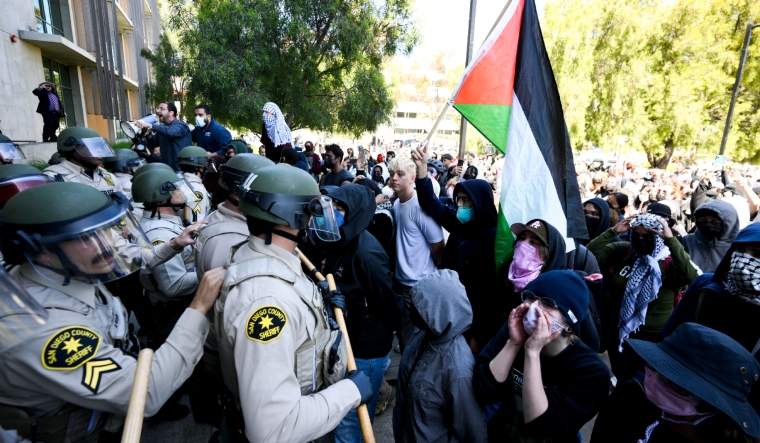In light of the war in Gaza, students of universities across the United States of America have initiated intense anti-Israel protests. Why are students in the US divided over an ongoing conflict in far-away Gaza? Here is understanding the development in the simplest of terms.
War in Gaza: The backdrop
Israel's military offence in the Hamas-controlled Gaza Strip has been ongoing since October 7, 2023. The Israeli government declared a state of war after an unprecedented cross-border offensive by Hamas had claimed 1,200 Israeli lives -- mostly civilians. In response, the Israel Defence Forces (IDF) launched an offensive vowing to destroy Hamas militarily. However, the Israeli forces have reportedly killed approximately 35,000 people in Gaza, including women and children, while the number of injured has surged to 80,000.
US student community reacts
The pro-Palestine protests erupted at Columbia University, New York, on April 17 before many other universities in the country followed suit. The students were encamped on the university premises and annexed an academic building before being removed by the police forces on April 18. This resulted in the arrests of around 100 students.
What do the student protesters want?
The protesters are demanding the universities to cut off their ties with Israel and the organisations in support of the war. They have also demanded greater transparency in the university finances and amnesty for the protestors. The students are disrupting the classes and the university operations, even causing the cancellation of graduation ceremonies. The protests, which started in mid-April, have now spread across the globe to the UK, France, Australia, and other countries.
University reaction and implications
However, some reports suggest that even though the protestors are arguing that they are peacefully endorsing the rights of the Palestinians, some have posed violent threats, anti-Jewish remarks, and hate speeches.
The university management is taking strict disciplinary actions against the student protestors, including expulsions from study abroad programmes and suspensions. According to reports, even criminal charges are pressed against the protestors.
The police had to use munitions like pepper spray, stun grenades, and even unintentional gunfire to regulate the protests on some occasions. More than 2,000 students have been arrested nationwide, with some facing legal charges for violating the rules of the universities. After a week-long silence, President Joe Biden released his statement acknowledging the students’ right to protest but described the ongoing demonstrations as unrestful. Vandalism, destroying college properties, disrupting university workings, and cancelling graduation and classes cannot be considered a way of peaceful demonstration, Biden noted.
Many universities have agreed to address the concerns of the protestors and have organised discussions with student representatives. Some universities are taking measures to contain the ongoing protests without disrupting the upcoming commencement ceremonies, while others have failed to do so.
The demonstrators have also protested at the Met Gala event, weeks after the protests in universities commenced, leading to several arrests. The protests have spread globally, and they are happening to different degrees in different universities. There is a high chance that the protests can continue until there is a resolution to the war conditions.


